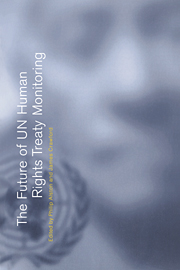Book contents
- Frontmatter
- Contents
- List of Tables, Figure, Appendices
- Notes on Contributors
- Editors' Preface
- Table of Treaties
- Table of Cases
- List of Abbreviations
- 1 The UN human rights treaty system: A system in crisis?
- A The UN human rights monitoring system in action
- B National influences and responses
- 9 Making human rights treaty obligations a reality: Working with new actors and partners
- 10 Domestic implementation of international human rights treaties: Nordic and Baltic experiences
- 11 The domestic impact of international human rights standards: The Japanese experience
- 12 The role of human rights treaty standards in domestic law: The Southern African experience
- 13 Uses and abuses of the treaty reporting procedure: Hong Kong between two systems
- 14 The United States and the international human rights treaty system: For export only?
- C Regional and sectoral comparisons
- D Common challenges for the treaty bodies
- E Looking to the future
- Index
12 - The role of human rights treaty standards in domestic law: The Southern African experience
Published online by Cambridge University Press: 23 December 2009
- Frontmatter
- Contents
- List of Tables, Figure, Appendices
- Notes on Contributors
- Editors' Preface
- Table of Treaties
- Table of Cases
- List of Abbreviations
- 1 The UN human rights treaty system: A system in crisis?
- A The UN human rights monitoring system in action
- B National influences and responses
- 9 Making human rights treaty obligations a reality: Working with new actors and partners
- 10 Domestic implementation of international human rights treaties: Nordic and Baltic experiences
- 11 The domestic impact of international human rights standards: The Japanese experience
- 12 The role of human rights treaty standards in domestic law: The Southern African experience
- 13 Uses and abuses of the treaty reporting procedure: Hong Kong between two systems
- 14 The United States and the international human rights treaty system: For export only?
- C Regional and sectoral comparisons
- D Common challenges for the treaty bodies
- E Looking to the future
- Index
Summary
South Africa, Namibia and Zimbabwe occupy a special place in the history of United Nations action to promote human rights. The perpetuation of white minority rule in these territories in a world order committed to decolonisation, self-determination and majority rule provoked a concerted response from the United Nations, which included economic sanctions and the toleration of military support to national liberation movements. United Nations action against Southern Rhodesia (as it then was) was premised on the denial of self-determination and the perpetuation of minority rule. The international status of South West Africa/Namibia and the failure of South Africa to honour the obligations contained in the Mandate for South West Africa provided the basis for United Nations action against South Africa. In South Africa itself racial discrimination, political repression, military intervention in neighbouring states and minority rule combined to justify United Nations intervention. But in all three cases there was a serious denial of human rights and most of the resolutions adopted by the General Assembly and the Security Council on these three territories castigated the government or the administering authority for its denial of human rights to the majority of the people. The action of the United Nations in the Southern African region can therefore legitimately be characterised as action taken to promote human rights.
It is not surprising that when change came to these territories the national liberation movements involved in the negotiations that led to the establishment of new political orders should insist on constitutions that provided guarantees for human rights.
- Type
- Chapter
- Information
- The Future of UN Human Rights Treaty Monitoring , pp. 269 - 286Publisher: Cambridge University PressPrint publication year: 2000
- 2
- Cited by



